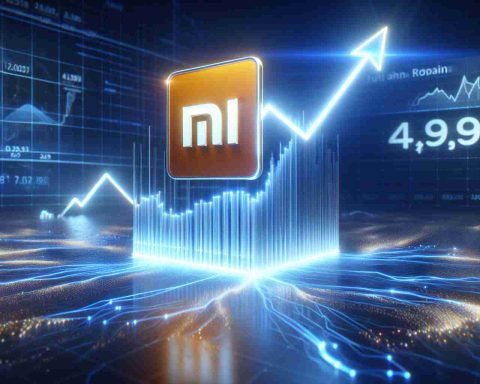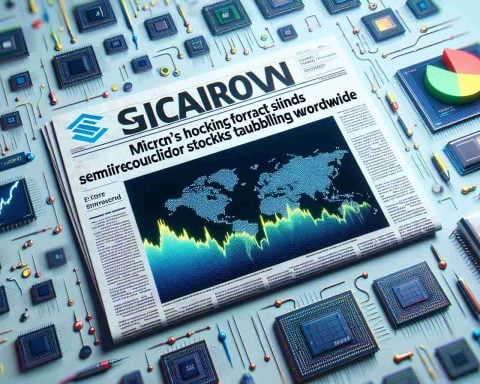In the whirlwind of the semiconductor industry, Taiwan Semiconductor Manufacturing Co. (TSMC) has secured its place at the pinnacle of the global pure-play wafer foundry sector during the third quarter, according to a report by TrendForce. Bolstered by the demand for innovative smartphone releases and the surge in high-performance computing needs, TSMC increased its market share to a commanding 64.9%, distancing itself further from its closest rival, Samsung Electronics.
Impressive Financial Growth
TSMC’s sales soared to an impressive US$23.53 billion between July and September, marking a 13.0% increase from the previous quarter. This growth can largely be attributed to the company’s enhanced production capabilities and significant wafer shipment volume, capitalizing on new technological advances and market trends.
Challenges for Samsung
Conversely, Samsung faced challenges as some of its clients’ products neared the end of their product lifecycle, along with mounting competitive pressures in mature technology sectors from Chinese players. Consequently, Samsung’s sales fell to US$3.36 billion, with its market share dipping to 9.3% from the previous quarter’s 11.5%.
Market Performance Snapshot
The global stage of wafer foundry operators recorded substantial overall sales of approximately US$34.9 billion, partly driven by cutting-edge 3-nanometer processes. Among notable performers, China’s Semiconductor Manufacturing International Corp. (SMIC) stood in third position with US$2.17 billion in sales, while Taiwan’s United Microelectronics Corp. and U.S.-based GlobalFoundries followed closely.
Industry Outlook
Looking ahead, the sector anticipates continued growth fueled by expanding demand for advanced technologies, particularly in the 5nm and 3nm processes. Nonetheless, older processes like 28nm may experience only modest growth in the coming quarter.
The Competitive Race in the Semiconductor Industry: A Deep Dive into TSMC’s Dominance
Market Dynamics and Innovations
The semiconductor industry is witnessing swift advancements, with TSMC leading the charge in innovative manufacturing processes. The company’s dominance in the pure-play wafer foundry sector is underscored by its significant market share of 64.9% in Q3, drastically outpacing competitors like Samsung. This remarkable market ascendancy corresponds with the industry’s broad trend toward miniaturization, as the demand for 3-nanometer technology accelerates.
Trends Shaping the Wafer Foundry Market
The transition to smaller nodes such as 5nm and 3nm has been instrumental to TSMC’s growth. Current market analysis indicates a movement toward these advanced nodes, driven by increasing integration in 5G technologies, AI, and high-performance computing applications. These advancements offer significant power and efficiency improvements over older nodes like the 28nm, which are observing stagnant growth.
Innovations and Future Predictions
TSMC remains at the forefront of innovation within the semiconductor industry. Their ongoing investment in R&D is aimed at refining existing nodes and developing more efficient processes. Experts predict that TSMC’s focus on sustainability in production could set benchmarks for eco-friendly practices in semiconductor manufacturing. Moreover, the company is enhancing its security measures to protect its intellectual property amid rising cybersecurity threats.
Pros and Cons of Current Market Players
While TSMC boasts robust financial growth and expansive market share, competitors face varied challenges. Samsung grapples with the maturation of its product lifecycle and pressures from emerging Chinese competitors, which has resulted in a market share drop to 9.3%. Despite these hurdles, Samsung’s persistent efforts towards emerging technologies could signal a turnaround in upcoming quarters.
Comparisons and Industry Controversies
Industry comparisons favor TSMC due to its aggressive scaling strategies and market leverage. However, some controversies surround the geopolitical influences on semiconductor supply chains, particularly the impact of the U.S.-China trade relations. This geopolitical landscape could influence market dynamics, placing pressure on foundries to diversify their investments and supply chains.
Sustainability and Security Insights
As environmental sustainability becomes a corporate megatrend, TSMC’s initiatives toward reduced energy consumption and reduced carbon footprint are crucial. On the security front, the semiconductor industry faces growing risks, leading companies like TSMC to implement strict security protocols and invest in cutting-edge cybersecurity technologies to safeguard their processes.
Conclusion
In summary, TSMC’s stronghold in the market is paved by its strategic focus on cutting-edge technology, adapting to market needs, and prioritizing sustainability and innovation. As technological trends continue to evolve, TSMC’s forward-thinking practices position it favorably in the semiconductor industry’s fiercely competitive landscape.























